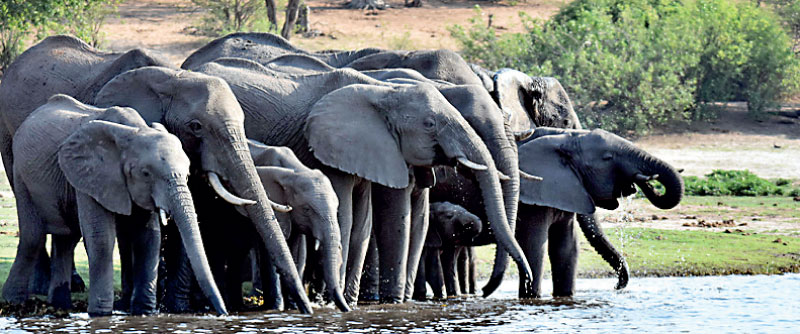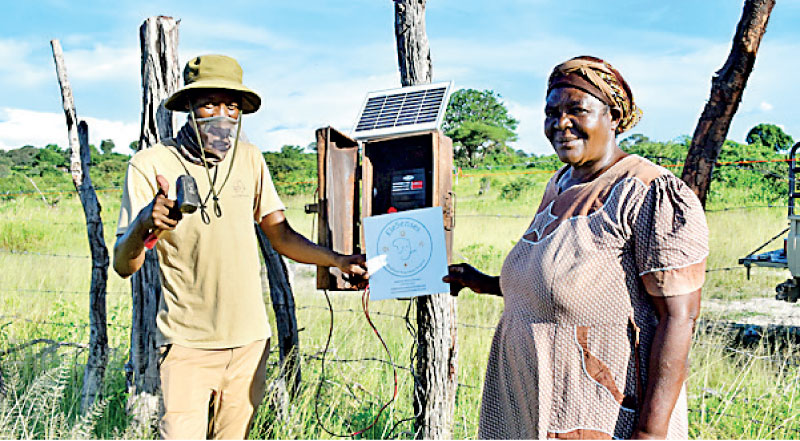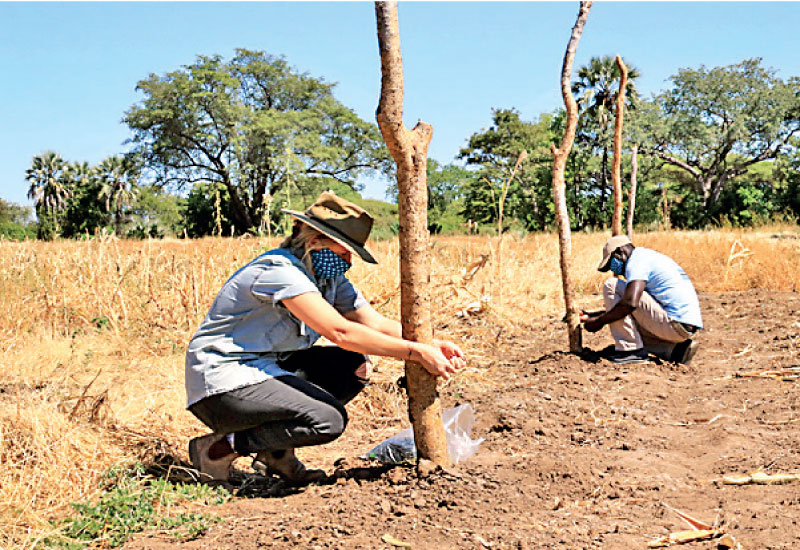Wednesday Feb 18, 2026
Wednesday Feb 18, 2026
Thursday, 17 November 2022 00:32 - - {{hitsCtrl.values.hits}}

Elephants without Borders, Botswana Coexistence and Education Manager Dr. Tempe Adams to speak on “Living with the world’s largest elephant population”

EleSenses Toolkit, a low-cost, user-friendly, mobile, solar-powered green, sustainable, mitigation system aimed to protect human lives and property

Working together with the community
|
Dr. Tempe Adams
|
A top researcher and conservationist from Botswana Dr. Tempe Adams will address the Wildlife and Nature Protection Society’s monthly lecture on 17 November from 6 p.m. at the Jasmine Hall, BMICH.
Dr. Adams who is Elephants without Borders, Botswana Coexistence and Education Manager will speak on the topic “Living with the world’s largest elephant population”.
WNPS said Sri Lanka, sadly, has the most incidence of human-elephant conflict (HEC) among countries that host the Asian Elephant. This is a topic that has dominated conservation for the past 50 years as human populations and development have increased with a corresponding decrease in elephant habitat; especially due to unplanned development, illicit deforestation and illegal encroachments into protected areas.
Today, humans share over 40% of the country’s landscape with elephants. Such have been the efforts to find solutions to this, to change from conflict to coexistence, that Sri Lanka’s scientists and researchers are seen as the experts on the subject, in relation to Asian elephants. Their knowledge and expertise, especially on tried and tested tools to help achieve this goal, are eagerly sought in other Asian countries that, like us, seek to protect their last populations of wild elephants.
So, what is it like to live with the world’s largest population of African elephants? Botswana holds this proud accolade with an estimated 125,000 elephants living there. In the Chobe Province alone, in Northern Botswana, there are an estimated 32,000 elephants, in the dry season, who live alongside a population of 30,000 people.
In comparison to Sri Lanka, with Botswana being much, much larger than Sri Lanka, and the human populations directly involved being considerably smaller, there are still numerous threats to these magnificent creatures, poaching being one, and human-elephant conflict another.
WNPS said Dr. Adams will discuss the similarities and differences in the challenges faced in protecting the Botswana and Sri Lankan elephants. EWB is a non-profit, non-governmental organisation that has been operating in Botswana since 2004, and is dedicated to the protection and conservation of Africa’s elephants.
It has created a ‘Side by Side’ Elephant Coexistence Program and offers a holistic approach combining science and community empowerment to combat conflict. To assist with this, they have created the ‘EleSenses’ Toolkit, a low-cost, user-friendly, mobile, solar-powered/green, sustainable, mitigation system aimed to protect human lives and property. They have also been conducting long-term studies monitoring elephants and wildlife movements across the landscape of both the international movements between countries and, at a fine spatial scale, around villages and towns.
Corridors are identified by wildlife’s movements between needed resources. This information is vital and is shared with a range of stakeholders to incorporate corridors into land-use management plans and provides indications of how wildlife is adapting to people and development, over time.
Dr. Adams uses its innovative research and educational studies, and information sharing with all people, to strive to encourage mankind to live in harmony with wildlife and the natural world. Her role in the organisation is working with communities and helping them live and farm within wildlife areas, free from conflict. She is currently based in the Chobe District.
She has published a number of scientific publications on combating human-elephant conflict by conserving elephants and empowering rural communities. Her research has been featured on BBC and CNN as well as in the Times, and National Geographic publications, to name a few. Her overall goal is to further develop ways for communities and wildlife to coexist in close proximity to one another, by improving ways to manage wildlife corridors and other low-impact, long-term mitigation strategies, while increasing the communities’ involvement.
She works on the premise that Conflict Resolution cannot happen instantly but must be worked on and cared for over time, through rigorous science and the building up of relationships between those affected by conflict and the relevant authorities.
The WNPS monthly lecture is supported by the Nations Trust Bank. Dr. Adams visit is enabled with the kind support of Dilmah Conservation and Jetwing Group.
The lecture is open to both members and non-members, entrance free. We are happy to recommence our physical lecture at the BMICH whilst continuing both Zoom and FB live.